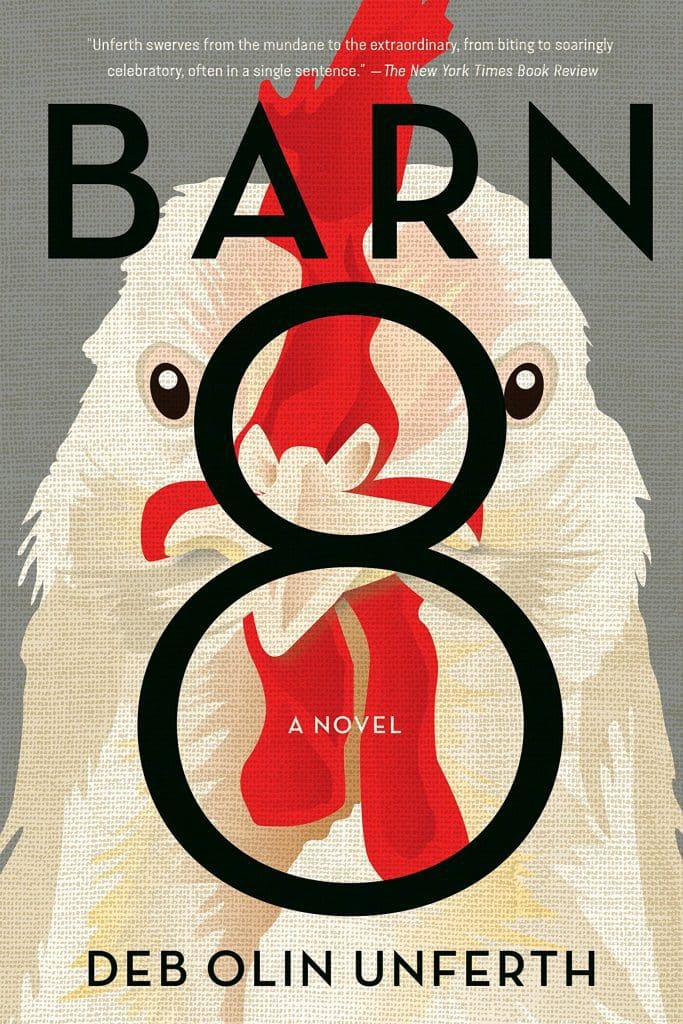The premise of Deb Olin Unferth’s latest novel, Barn 8 (252 pages; Graywolf Press), involves the heist of a comically extreme number of chickens—yet to label the novel a mere comedy would be tantamount to calling Kurt Vonnegut a “humor writer.” Sure, the book is funny, quite funny, but it is much more. Unferth is tackling, with great wit and technical skill, topics as pressing as Big Agriculture, the humane treatment of animals, and the impossibility of maintaining ideological purity in any social movement.
The reality is that Americans love eggs: free range or not, we will eat as many eggs as the agribusiness can produce; in fact, more than they can produce. It’s an insatiable demand that big farms (which are akin to corporations at this level) have attempted to meet through methods that would appall most consumers if we spent even twenty seconds watching footage on YouTube. But so much of our cultural eating habits boil down to “out of sight, out of mind”—if we don’t have to see how those eggs wind up as part of our morning omelet, then we are content to continue eating them. It makes sense, then, that Cleveland, one of the main characters who helps kick off the daring heist in Barn 8, is an auditor for the U.S. egg industry, who witnesses firsthand the awful conditions on many hen farms:
They have to be able to just stand there in those cages for months and months, their lungs filling with dander. They have to be able to take the onslaught of massive doses of inoculations, to endure sensory overloads and deprivations, clown-car crowding, the vicious pecks of their cell mates. They have to be resistant to disease. They have to tolerate violence, noise, panic, and not drop dead of heart stress (as many do, apparently).
As a child, Cleveland had always looked up to her cool, older babysitter Olivia; when Olivia dies in a car accident years later and leaves her daughter Janey in Cleveland’s care, the pair form a plot with the aim of releasing close to a million hens from captivity. Soon, other animal activists are drawn to their cause. Of course, the larger their conspiracy gets, the harder it becomes to control, and the entire operation grows susceptible to bad actors. Unferth is able to generate suspense simply because the reader knows that, based on the title of the book, the location Barn 8 will hold great significance to the plot, and we arrive there with a sinking feeling of dread.
Though the novel is driven by its central cast, the wide range of supporting characters—from radical anarchists to family farmers—allows Unferth to frequently take a micro view of Barn 8’s social concerns, and the story is bolstered by an incredible amount of research. (Indeed, the acknowledgements thank the many commercial layer hen farmers and industry scientists whom Unferth interviewed for the project.) If this makes Barn 8 sound like a vegan screed, far from it. The novel only promotes an awareness of the issues it presents; reading it fosters a sense of compassion for the countless animals who endure a horrific existence just so the United States can continue to produce more food than almost any developed nation. The reader comes away with a simple question: can’t we find a more humane way to go about this?
Unferth gets us to this place while being hilarious and rendering a group of characters who engender our sympathy, including Dill, a man willing to risk his relationship with his beloved partner out of a begrudging but unshakable desire to rescue animals in need. And the voice Unferth has crafted to tell this story proves a character unto itself—not quite omniscient but getting there, nimble in its ability to leap from character to character. It’s a voice that also consistently grants the animal world a higher level of autonomy than most of us do, in part because we want to be able to shop at Whole Foods without losing sleep over it:
Adult chickens have over thirty categories of conversation, each with its own web of coos and calls and clucks and struts. Chickens gossip, summon play, flirt, teach, warn, mourn, fight, praise, and promise.
It wasn’t without reason the beginning of this review mentioned Kurt Vonnegut. Unferth’s Barn 8 strikes a similar balance between the comic and tragic, the political and the personal as the best of Vonnegut. Readers should find in its zaniness and heart something of a balm during these trying times.

